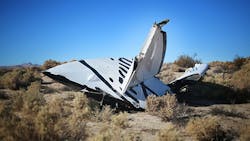The recent explosion of Orbital Science's Antares rocket and the crash of Virgin Galactic’s SpaceShipTwo delivered a hard blow to the commercial space industry.
While anomalies are, by definition, rare, any time something goes wrong on a space mission or test flight, it’s a cause for concern. These are high profile launches with tons of time and money invested in them.
And this time, on the Virgin Galactic flight, one pilot was killed and another seriously injured.
The space industry alone is a relatively new industry all things considered, and the commercial space industry is even newer – something that’s been forming for less than 10 years.
The recent explosion and crash just highlight how new the commercial space industry is.
| The Commercialization of Space: Selling the Final Frontier |
“It certainly leaves a question mark in the general public’s eyes: how routine is this or safe is this?” said Carlos Grodsinsky, chief operating officer and senior vice president of technology at ZIN Technologies, an Ohio-based engineering services firm. “It is catastrophic obviously, but it doesn’t just end everything.”
Grodsinsky likens its development to that of the commercial air travel market.
Commercial space, he said, is actually developing faster than the commercial aviation market.
Back in the early days of commercial flight, the willing could pay pilots for rides in aircraft, to fly in the skies largely unregulated and devoid of standardization, not unlike Virgin Galactic, which is selling $250,000 reservations for suborbital spaceflights.
The risks then – and the toll on human life –were comparable to that which exists in the emerging commercial space market.
A Strengthened Resolve
The development of the industry, like with any new industry, will become a balance of transitioning those checks and balances established by NASA into regulations and standards that make sense and are viable for the commercial market.
“While Orbital Sciences is under the oversight of NASA, Virgin Galactic is essentially writing its own rules,” said Ted Southern, president of Final Frontier Design, a New York-based private design firm that makes aerospace safety garments. “The industry is too young and tenuous not to regulate it.”
The unfortunate events in the industry may only prove to strengthen the resolve of those involved in it.
“For some, myself included, the feeling is galvanizing, a recognition of the inevitable growing pains of a new and rather dangerous industry,” Southern said.
“For others, the reaction is rather negative, either an "I told you so" or "this is impossible for private industry" attitude. Either way, I believe commercial space will continue to grow and thrive, with a refocus on safety, redundancy and reliability, and a fundamental recognition that space flight is not easy.”
Virgin Galactic is already working on a replacement spaceship for SpaceShipTwo, and is expected to begin test flights by next summer.
“The recovery is just very difficult. It’s not like when a [jet] flight gets canceled and you just rebook. In this case, it affects a lot of other things,” said Grodsinsky, whose company had nine pieces of equipment for the International Space Station on the failed Orbital Sciences cargo mission.
Because the commercial space market is so small, it’s not a matter of turning to a new supplier in the supply chain. It’s a matter of identifying the error, correcting it and rebuilding.
“These recent accidents will delay progress for both Virgin Galactic and Orbital Sciences. It takes time to understand the root causes of complex incidents like this,” Southern said.
“I am quite sure it is in the interest of individual companies and the industry as a whole to pay close attention to any anomalies, catastrophic or otherwise, and to address them completely.”
About the Author
Ginger Christ
Ginger Christ, Associate Editor
Ginger Christ is a former associate editor for EHS Today, a Penton publication.
She has covered business news for the past seven years, working at daily and weekly newspapers and magazines in Ohio, including the Dayton Business Journal and Crain's Cleveland Business.
Most recently, she covered transportation and leadership for IndustryWeek, a sister publication to EHS Today.
She holds a bachelor of arts in English and in Film Studies from the University of Pittsburgh.
